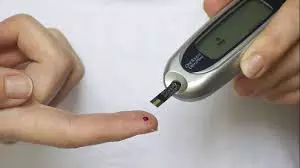Type 1 diabetes among children calls for health personnel at schools

Hyderabad: The prevalence of Type 1 diabetes (T1D) among schoolchildren has highlighted the critical need for better infrastructure and awareness within educational institutions.
Despite T1D being a lifelong condition that may necessitate daily insulin injections, many schools remain ill-equipped to handle the needs of these children, often lacking a dedicated nurse on-site to assist with their care. This lack of support places an additional burden on the students, say families.
The lack of awareness and adequate support in schools has also affected parents. Said a parent, whose eight-year-old daughter has T1D. "My kid was rejected by many schools. She is now studying in a private school, but she feels rejected due to her medical condition. I have to go to the school every afternoon to give her insulin and check her blood sugar level.”
“The knowledge about T1D among the teaching and non-teaching staff in schools is lacking. All teachers should have counselling about this particular condition. Schools should have a nurse for any such cases; it would be helpful for parents like me and also for the children," she told Deccan Chronicle.
Another parent, whose daughter suffered from T1D during her school days, says, “Managing insulin, medications, sleep, and food during school hours was a challenge. It's sad that the conditions for such children in school are still the same."
Dr Rakesh Sahay, professor of endocrinology at Osmania General Hospital, spoke about the urgent need for greater awareness about T1D. "Every day, we see one or two new cases of T1D, and over 200 people come to us for insulin and other essential requirements," he stated.
"Even though the government provides some support, there are still a lot of people with T1D. They make up less than 15 per cent of the population. About one in 1,000 people has T1D, and it's really important for them to keep an eye on their blood sugar levels. Educating parents and counselling them with the proper guidance is also a challenging task."
Dr Jagadish V., diabetologist from a private hospital, pointed to the varying needs of T1D patients, especially children. "There are six types of diabetes, but we often see 10-15 per cent in T1D and 80-85 per cent in T2D. Not every T1D case is similar. They differ from person to person and require different types of insulin. Some require long-acting insulin, some require intermediate-acting insulin, and some require short-acting insulin. It's a big deal to handle it and schools have a huge responsibility of taking good care of these."
Dr P. Avinash, a paediatrician from a private hospital, said "Occasionally, we get T1D cases where parents come with the complaint of seeing symptoms such as excessive thirst, frequent urination, increased hunger, vision blurriness, weight loss, and fatigue. After a couple of tests, they come to know that their kids are affected by T1D. These kids have specific food requirements, especially in school, where they have to take insulin and keep testing their blood sugar levels. Not all schools have a dedicated nurse for observation, which would be helpful for the kids and parents," he told Deccan Chronicle correspondent.
The CBSE has allowed students having T1D to carry with them insulin pumps, sugar tablets, chocolates, candy, fruits, snack items and medicines as required by a doctor's prescription. A. Sridevasena, commissioner and director of school education, was unavailable for comment on how the government intended to help such children in schools in the state.

